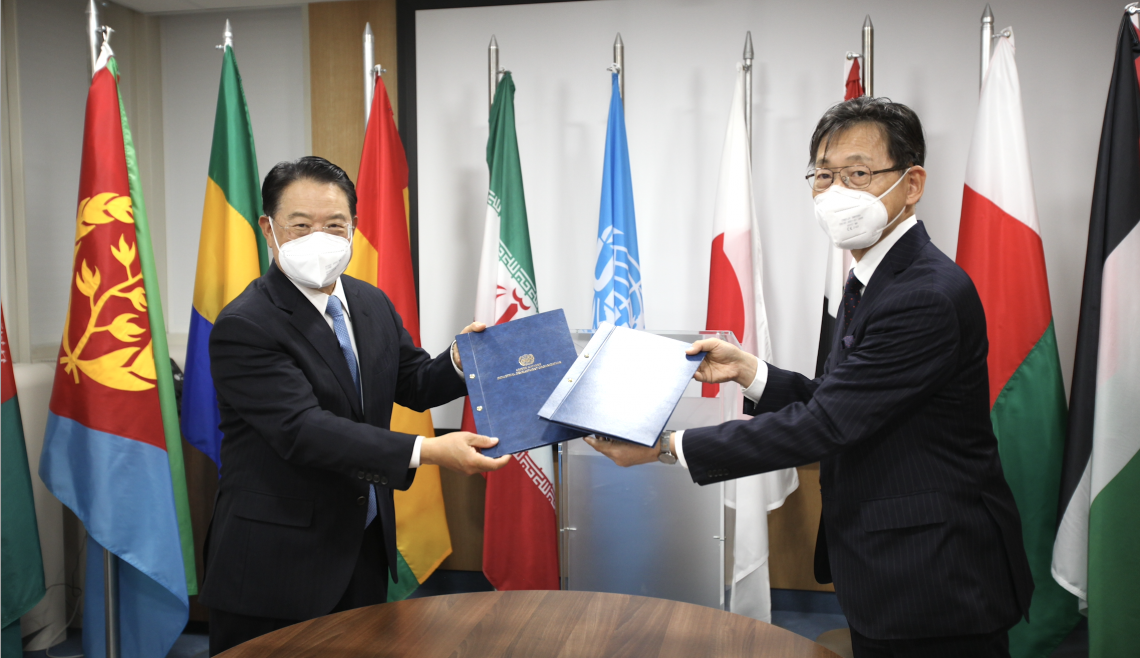Japan supports ten UNIDO projects with US$7.29 million
27.04.2021

VIENNA, 19 April 2021 – The United Nations Industrial Development Organization (UNIDO) and the Government of Japan are joining hands to implement ten new UNIDO projects with a total budget of US$7.29 million. At today’s kick-off event, LI Yong, Director General of UNIDO, and Ambassador Takeshi Hikihara, Permanent Representative of Japan to the International Organizations in Vienna, marked the start of projects in Afghanistan, Eritrea, Gabon, Ghana, the Islamic Republic of Iran, Iraq, Madagascar, the State of Palestine, the United Republic of Tanzania, and Yemen. The event was attended by representatives of the beneficiary countries.
In his remarks, UNIDO’s Li noted that “a sensible and sustainable recovery has to start now to mitigate the severe and long-lasting effects of the pandemic,” adding, “We must apply the lessons learned from last year and tackle the challenges ahead of us. We have to strengthen job creation, build on the benefits of digitalization, advance gender equality, fight against inequalities and the climate crisis.”
Li further said, “I am grateful to the Government of Japan for the early response to address the public health challenges and socio-economic consequences of the pandemic.”
Ambassador Hikihara stated that “these projects were adopted in the midst of an unprecedented human security crisis caused by the COVID-19 pandemic. Our goal is to provide support to those who are struggling to overcome the crisis, and then to help build back better.”
He added, “UNIDO’s mandate is more relevant than ever. We expect that UNIDO makes full use of its potential as a platform for partnership bringing together recipients, donors and their private sectors.”
By providing a combination of capacity-building programmes in entrepreneurial skills, social cohesion, women’s empowerment, and COVID-19 workplace safety, the project in Afghanistan will help beneficiaries to improve their skills and enter the job market or start their own business. The revitalization of the Industrial Support Development Centre in Asmara will be in the focus of the project in Eritrea where an institutional support system for the leather sector, capable of developing industry-relevant human resources, will be established.
Through the project in Iraq, UNIDO will work with host communities and internally displaced people living in displacement camps across the Nineveh Governorate, providing them with sustainable economic and livelihood opportunities. In Yemen, the intervention will also support vulnerable groups of people through a provision of technical and soft skills training to improve livelihoods, promote resilience and contribute to the stabilization of the country.
The project in the Islamic Republic of Iran will support handicraft industries in the country through capacity-building and skills development initiatives. At the same time, the project will improve the resilience of the Sistan and Baluchestan Province against COVID-19, facilitating market access and promoting sustainable employment opportunities. Similarly, in the State of Palestine, the UNIDO project will strengthen the competitiveness of the garment and fashion sector. A new Gaza – Creative Fashion Design Hub will provide a platform for designers and entrepreneurs to develop projects and boost ideas through new fashion formats. Both projects are focusing on an increased participation and employability of women and youth in the identified sectors.
In Gabon and the United Republic of Tanzania, the projects will specifically focus on the countries’ personal protective equipment production capacities by upgrading relevant domestic producers, suppliers and public institutions in terms of production, product quality and business resilience. Similarly, the project in Ghana will address the country’s need to reinforce, both quantitatively and qualitatively, its capacity to supply critical preventive equipment. Through the project in Madagascar, UNIDO will address current COVID-19 challenges by supporting the development of an action plan for the introduction of environmentally sound management of healthcare waste. The project will also involve demonstration of Japanese technology for final disposal treatment to help halt the spread of the virus.
Related Links
- UNIDO Contributes to Asia-Pacific Smart Cities Workshop – Promoting Disaster-Resilient Te…
- Tanzania Investment Seminar, 3 June 2025
- Press Release: UNIDO, Sierra Leone and Japan inaugurate Centre of Excellence to drive you…
- Quarterly Report: The Project for Promoting Youth Employment through Construction Equipme…
- Quarterly Report: The project for promoting youth employment through automotive maintenan…

